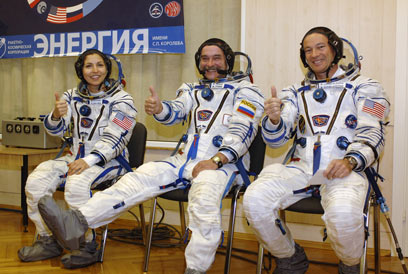
Seeing the earth from above
She spent $20 million to fulfill her dream and became the first Muslim woman to travel to space. In a special interview with Yedioth Ahronoth, Anousheh Ansari, an American high-tech tycoon of Iranian descent, describes her journey to space, shares her thoughts on Mideast conflict
Ansari would tell her parents, "Some day, I will make it to space." Her parent's believed this was just another childhood dream that would fade away with time, but in order to encourage the child with the big imagination, they would nod in agreement and go along with her fantasies.
At the age of 16 she and her family left the land of Ayatollahs for the United States. Over the years she became a telecommunications and high-tech tycoon, but her childhood fantasy would not let up. "I never gave up on the idea. I didn't know how it would happen or what I could do to help it happen, but I knew I would find a way to do it," she says. "I had a backup plan in case I couldn't make it any other way. I told my husband, 'If I die before flying to space, you have to make sure to somehow send my ashes up to space'."
Supportive family
Four years ago, 44-year-old Ansari got the chance to make her dream come true – an American travel agency that specializes in sending businesspeople to space was offering a place on a Russian shuttle for the astronomical sum of $20 million. Ansari, who has a bulky bank account, did not hesitate and signed up for the program. It was the best gift she could have received for her 40th birthday. One of the first things she did after purchasing the package was call her parents and say, "Guess what?"
Your family didn't object?
"I was lucky that my husband understood this was something I've wanted to do for a very long time. My family was very supportive. They were also worried, but this did not make them ask me not to go. They even came to the shuttle's launch and prayed for my wellbeing."
In order to prepare for the flight, Ansari trained at NASA's facilities and at a military base in Russia where cosmonauts are trained. On September 18, 2006, Ansari lifted off with American astronaut Miguel Lopez-Alegria and Russian cosmonaut Mikhail Tyurin on the Soyuz TMA-9 spacecraft from the Baikonur Cosmodrome in Kazakhstan. Ansari's journey lasted 10 days, and included a stay at the International Space Station. She became the world's first female space tourist, and its fourth private space explorer. Ansari broke even more records by becoming the first Iranian woman and first Muslim woman to travel to space.
Were there stressful moments on the flight?
"There were no dangers, but my body went through a lot of changes on the first few days and I felt nauseous and had very bad headaches. Overall, I loved flying in zero gravity, floating in the spaceship and feeling this weightlessness. It was fun, I enjoyed every minute of it."
What's the strongest memory you have from the journey?
"The first time I saw the earth from above – I realized I really was in space and it wasn't a dream. I felt like I had died and was looking in on my body and life from the outside."
How did the flight experience change your life?
"The flight helped me see the world as one; without borders and troubles. Ever since the journey, I think of every project I embark on as one that has an impact on the entire world. It makes you fee small, because we are a small part of a very large universe."

Ansari (L) with crewmates (Photo: Getty Images)
Ansari is currently promoting her autobiography, "My Dream of Stars", which has recently hit the shelves, as well as the new documentary "Space Tourists", which tells Ansari's fascinating story. The movie, which was directed by the Swiss filmmaker Christian Frei depicts a brave and controversial woman who is determined to make changes in this world.
Good memories from Iran
Ansari immigrated to the "land of opportunity" at the age of 16. She did not know any English, save for a few lines from the film "The Sound of Music", but this did not stop her from fulfilling the American dream. She learned the language, received degrees in computers and electrical engineering, and during her time working at a high-tech company, she fell in love with a man named Hamid. The two married in 1991, quit their jobs, pulled their savings together, and established a telecommunications company. In 2000, after the company had become a success, they sold it for over half a billion dollars, but remained involved in its management.
Ever since, Ansari hasn't stopped securing her position. In 2000, the US government granted her an entrepreneurial excellence award, and Forbes magazine ranked her one of the 40 most influential women under the age of 40 in the world of high-tech. The magazine estimated her personal capital at some $180 million.
While Ansari had become acclimated in the US, she was always sure to highlight her Iranian background. Even on the flight that turned her into an international star, she insisted on embroidering the colors of the Iranian flag on the right shoulder of her spacesuit. The American flag was stitched on the suit's left shoulder. This decision sparked controversy among some in the US, and she was quick to explain that she was not making any kind of political statement. Moments before liftoff she told the official Iranian news agency, "I am proud to be the first Iranian-born female space traveler. I feel I am serving as a beam of light to millions of youths in Iran and giving hope to thousands of girls and women that dreams can come true." Women's organizations in Iran were thrilled to use their new heroine as an example proving that Iranian women were blessed with many abilities, and are capable of doing many things besides giving birth.
Why was it so important for you to wear both the Iranian and American flags and highlight your Iranian roots and identity during the space travel?
"These two countries are part of who I am. I grew up in Iran, and its culture and history shaped me, but through America, I learned a lot of new things, new liberties and ways of thinking. The US gave me the opportunities to achieve what I have achieved in my life, including the opportunities to fly to space. This is why I wanted to emphasize these things."
Have you had the chance to visit your homeland since you left it?
"I haven't been back there since I left, but I hold conference calls with people in Iran and I am kept up to date through my blog and website."
What do you miss most about Iran?
"I have a lot of good memories from Iran and I miss many things: A mountain in Tehran that I loved to look at, the nights when I loved to sleep on my grandparents' balcony, and the days I spent at the Jeanne d'Arc French School.
What do you think of Ahmadinejad's tyrannical regime and his nuclear program?
"I don't agree with his policies. Ahmadinejad is not helping the Iranian people; he's not creating economic opportunities or a good environment for growth. When I want to see a country that is developing quickly I look at China and India, people there don't stop progressing. I don't see that happening to young people in Iran and I don't see any peaceful interactions between Iran and other countries."
What do you think about the conflict and growing tension between Iran and Israel?
"It's a conflict that was under the surface for many years, and is related to the Middle East in general and not just Iran. From my personal experience, when I speak with young people in Iran and in Israel, they don't even know what the dispute is about and they want to go on with their lives in peace and quiet. I believe a significant part of the conflict in the Middle East stems from what the governments want – the conflict helps politicians and generals remain in positions of power and execute military plans and sell more weapons. By the way, a year ago I stopped in Israel for a quick two-day visit, and during the visit I met with students. It's a pity that you have this conflict over there, because Israel is a very beautiful country."
Today, Ansari and her family live in Dallas. She recently started a new high-tech company. "I also donate money to promote space tourism programs," she says. "I continue to look for opportunities to fly to space, and support other people who wish to go there. I also work to empower youth – world peace can only be achieved if the youth is more involved."
But with all due respect to Ansari's efforts to secure world peace, her historic journey in 2006 brought with it quit a bit of criticism. Critics called it a rich woman's whim, saying she spent an enormous amount of money on a trip to space, while back on earth there are people who are hungry, sick and poor. Ansari is aware of the slanderous claims. "Of course I had to deal with the criticism," she says. "People have an opinion about how you should spend your money. I respect this criticism, but I believe that each of us can make our own decisions. My trip was an incredible experience that I worked very hard for, and I had every right to do it."
Speaking of poverty, the documentary "Space Tourists" illustrates the large gap between the millionaire hovering in space and goofing around with her crewmates and the miserable lives of the people living in the mountains of Kazakhstan where the launch pad is located. Residents can be seen collecting the debris falling from Ansari's shuttle during liftoff. They use these rocket boosters to build housing and tools. The film also follows the damage caused by the rocket debris, some of which even falls on villagers' houses.
"When I was in Kazakhstan before the flight I learned about the situation there and I discovered how they collect the scrap metal and sell it," Ansari says. "I got the chance to meet with some of the people, and they are very poor indeed, but they were excited about the space program and liked it."
If they would make a motion picture about you, who would you want to portray you?
"Angelina Jolie. What do you think?"
- Follow Ynetnews on Facebook










